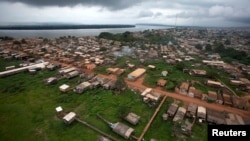A Brazilian activist on Tuesday won a top international honor for her long fight against a giant hydroelectric dam in the Amazon rainforest that has forced tens of thousands of indigenous people from their homes.
Antonia Melo is the first Brazilian to receive the Alexander Soros Foundation Award for Environmental and Human Rights Activism, designed to expose the impacts of projects such as the Belo Monte dam on the Xingu river.
The project, which will be one of the world's largest hydroelectric dams, will flood a swathe of biodiverse rainforest inhabited by the indigenous Xinguense people.
"This award will strengthen and shed light on our fight against this dam," Melo told Reuters.
Melo, 64, has been campaigning against the dam for more than two decades. Born in Brazil's Northeast region, she moved to the Amazon region where the dam is being built when she was 4 years old.
"I consider myself a Xinguense," she said.
Belo Monte is the largest and most high-profile of an estimated 100 hydropower projects planned for the Brazilian Amazon.
Some 40,000 people from small, riverside communities have already been forced from their homes by the project, twice as many as were projected before construction began in 2011, Melo said.
"Evictions are a very violent process that will remain in our hearts forever," she said.
A federal court in September suspended again the operating license for the dam, saying Norte Energia, the consortium running the project, did not comply with commitments made when it won the bid.
A Brasilia-based court ordered further construction halted until the consortium meets commitments to provide adequate housing for those driven from their homes.
Norte Energia has denied that it has failed to provide adequate housing and said it is complying with all commitments made when it won the tender.
Alexander Soros, founder of the Alexander Soros Foundation, said the award aims to shed light on the potentially damaging impact of megaprojects that could be more "environmentally catastrophic" than are logging and mining operations.
Environmental and land rights problems have worsened in Brazil amid political turmoil, corruption scandals and the country's worst recession in decades, Soros said.





